Throughout my case with the Department of Human Services, I remember saying several times that I was concerned about the changes I was seeing in my boys. I watched them progressively phase me out of their lives. I threw out the term ‘brainwashing’ several times, but I was ignored by authorities and my own lawyer. After all the research I have done on the topic, I am absolutely disgusted to realize how right I was!
In this article, I will review different aspects of brainwashing, including tactics used on victims, and symptoms they exhibit. I will close by discussing the actions that I have taken to address these concerns and future plans to continue my fight for justice for my family, and for all families!
I was researching the concept of ‘brainwashing’ when I came across a graphic listing “Eight Criteria of Thought Reform.” The list was originally published in 1961 in Thought Reform and the Psychology of Totalism, A Study of ‘Brainwashing’ in China by Dr. Richard J. Lifton. Lifton published a new edition in 2012 with an added preface reviewing the implications of his model as it relates to modern American religious cults. If you are interested in learning more about throught reform, I highly recommend it!
Eight Criteria for Thought Reform
In his book, Lipton offered information from the interviews of 40 individuals that were subjected to subversive and overt thought reform tactics at the hands of the Communist Chinese government. Leaning heavily on Erikson’s Stages of Psychosocial Development, and more specifically concepts related to ‘Identity versus Role Confusion,” Lipton analyzed the series of events and psychosocial effects and uncovered a definite pattern in both the behavior of the oppressors and the victims. From these he developed his Eight Criteria for Thought Control.
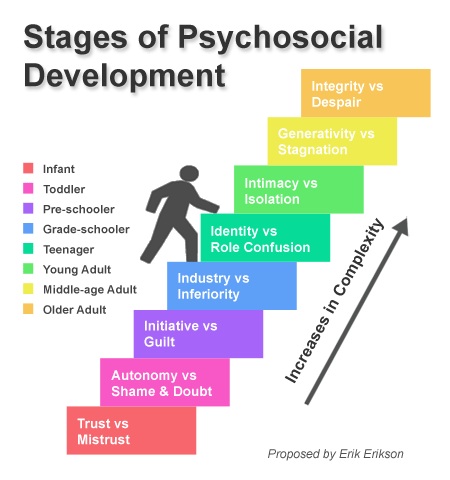
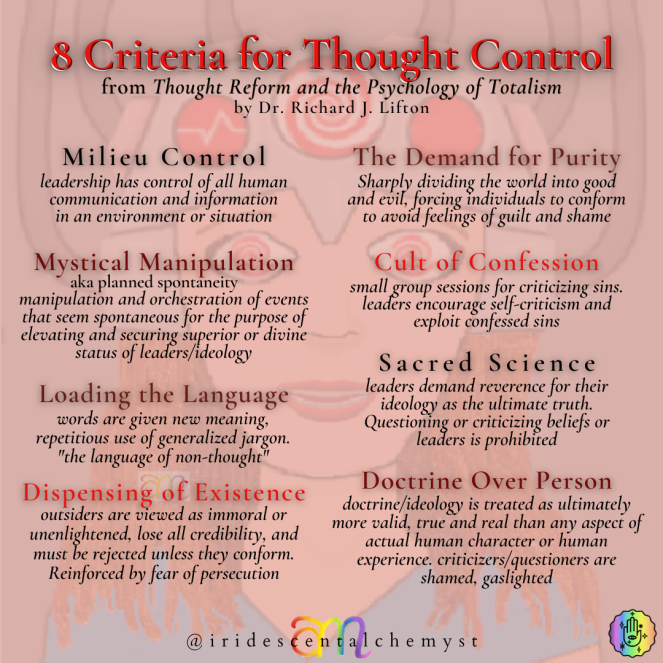
Coercive Persuasion
Another synonym for brainwashing is coercive persuasion and the term itself offers a pretty clear picture of the forceful tactics that are used to influence the thoughts of others. Edgar Schein, a brilliant researcher and former MIT professor, also studied patterns exhibited by Chinese POWs and their captors. He outlined theories very similar to Lifton in his book, Coercive Persuasion: A Socio-psychological Analysis of the “Brainwashing” of American Civilian Prisoners. This important publication is hard to come by, with ONE collectable hardcover edition currently available on Amazon for $350!

*Paid Link
Explore Your Mind (2019) summed up the four main categories for these coercive tactics: social environmental, cognitive, emotional, and those that induce dissociative states. Many of these items in the first three categories cause a breakdown in the psyche of an individual and contribute to the fourth category related to inducing dissociative states. Schein and his team based their work on Lifton’s book and added valuable insights to the discussion.
Social Environmental
This category of persuasion techniques involve control and manipulation of the subjects’ surroundings and environment. This works to weaken their resistance and make them easier to influence. Some of the specific techniques include:
- Isolation– closing off the individual from the outside world, physically and mentally.
- The foster family’s home was located 2 hours from my home, so I only had visits 1x per week.
- My phone calls were limited to 2x per week at a time designated by the foster family and due to my work schedule they rarely lasted longer than 20 minutes. At first they were consistent, but as time went on I wasn’t getting any phone calls. I reported this at multiple family team meetings, but there was never any follow up.
- On the occasion I was able to get a phone call with my sons, I would ask Noah where Eli was. His answer was consistently something like “he’s in bed because he was being bad.”
- Information control– another form of isolation that involves withholding information as a means of limiting critical thinking and ability to plan for the future
- When you are going through the family court process, or awaiting trial with criminal court, you feel paralyzed. You are unable to plan past the next court date. You never feel like you have all the information, and your life is essentially in their hands.
- Creating dependency– starts off as satisfying the subjects primary and secondary needs, eventually leads to existential dependency
- I was not informed of appointments, school events, and I had limited communication with my sons, likely increasing their feelings of dependency on the foster mom.
- I felt I had no choice but to encourage my sons to behave and “listen to the foster mom” because I wanted them to be good, at the same time I had no idea if the way she was raising them is in accord with my beliefs
- The foster family is very wealthy, and the subsidies they get to take care of my and other children only raises their wealthy and the disparities between our households.
- Psychological debilitation– severe depression affects your ability to make decisions, think critically, and can even cause physical symptoms. Behavior issues are noted in children.
- DHS repeatedly told me my son was acting out and needed medications, and they treated me like a bad mother when I refused, even after specialists and educators working with my son AGREED WITH ME. At first, it was ADHD medications, then later they wanted to prescribe antidepressants.
READ: I DO NOT believe in the use of ANY psychotropic medication in children, except maybe after ALL other therapies have been exhausted. Certainly NOT as a go-to, fix-all bandaid to manage kids “acting out” after being thrown into stressful situations. That is not a guesstimation… that is my PROFESSIONAL OPINION as a former Pediatric Nurse Case Manager that specifically managed the medication regimens for countless children over the years.
STOP MEDICATING YOUR KIDS JUST BECAUSE SOMEONE TELLS YOU THAT YOU SHOULD!
Emotional Techniques
Humans are emotional creatures, and one thing we definitely arent taught is how to control them. By controlling our emotions, we master ourselves. If others are able to manipulate our emotions, they have easy access to our subconscious motivations and subsequently, our behavior. Emotional techniques used include:
- Activation of pleasure– involves treating people well and is used to draw people in or praise them for conforming behaviors
- Activation of guilt, fear, or anxiety– the use of rewards and punishment to induce these feelings as a means of encourageing dependency and submission.
Cognitive Techniques
The items in this category build upon the previous two. Note the similarities with Lifton’s criteria, as his theories were discussed in depth by Schein and his team.
- Denigration of critical thinking– The individual is belitted and criticized when attempting to think critically or form their own opinion, which eventually leads one to question his or her own mind and repress individual thoughts.
- Use of deceit and lies– This is effective for distorting reality and breaking down the intellectual psyche.
- Demanding submission– Develops conformity.
- Group identity– Subjects begin to lose the sense of individuality and take on characteristics of the group.
- Controlling attention– Limiting what a person is exposed to long-term forces thoughts to focus in on the programming
- Control over language– Controlling language limits freedom. Omitting certain words or phrases, or altering the commonly understood definition cripples critical thinking and freedom of thought.
- Changing the source of authority– Merriam Webster (2022) provided the most encompassing definition for totalitarian: “of or relating to a political regime based on subordination of the individual to the state and strict control of all aspects of the life and productive capacity of the nation especially by coercive measures (such as censorship and terrorism)”
“There are only two means by which men can deal with one another: guns or logic. Force or persuasion. Those who know that they cannot win by means of logic, have always resorted to guns.”
Ayn Rand, Russian-born American Writer & Philosopher
Dissociative States
Dissociative states are a continuum that range from non-pathological, such as day-dreaming, to pathological presentations such as dissociative identity disorders (formerly known as multiple personality disorder). Lanius and Hopper (2008) report that dissociation is a common feature of post-traumatic stress disorder and it “involves disruptions in the usually integrated functions of consciousness, memory, identity, and perception of the self and the environment.” The Mayo Clinic (2017) lists the following possible symptoms involved with the disagnosis of dissociative disorders:
- Memory loss (amnesia) of certain time periods, events, people and personal information
- A sense of being detached from yourself and your emotions
- A perception of the people and things around you as distorted and unreal
- A blurred sense of identity
- Significant stress or problems in your relationships, work or other important areas of your life
- Inability to cope well with emotional or professional stress
- Mental health problems, such as depression, anxiety, and suicidal thoughts and behaviors
Continuum of Influence
If the information that I’ve covered so far does not raise some definitive red flags when you look at the world around you, then I encourage you to spend some time reviewing this chart introduced by Margaret Thaler Singer in her book Cults in Our Midst. Singer is a leading expert on cult psychology and the thought reform tactics these groups employ to recruit new members and entrap them. She designed the chart below as a means of comparing the different channels for influencing and persuading others. Note the major similarities and differences between each of the columns.
The chart can easily be adapted to be used as an assessment tool for analyzing organizations and institutions. For each row, you would then circle the corresponding box that most appropriately describes the organization or institution you are assessing. Often times it is difficult to determined just one box among the rows. In that case, I found it appropriate to select two or more boxes.
Grading the Department of Human Services
The following is my analysis of Benton Country DHS during the handling of my case. While some will undoubtedly say that I am biased in my assesment, I assure you I took care to maintain objectivity while examining each item. If I wasn’t sure right away which box to circle, I reviewed each of them carefully, making sure to put my ego and assumptions in check if needed. Sometimes it was necessary to select two boxes due to inconsistency. It reminded of exams in nursing school, when every answer was right, but you had to choose the best right answer.
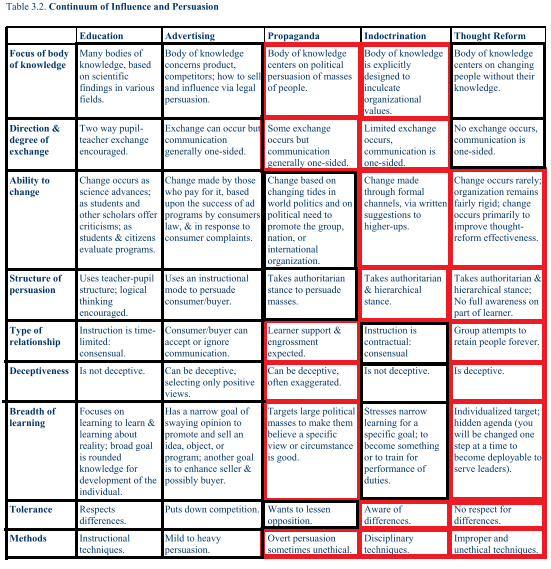
Propaganda=6, Indoctrination=6, Thought Reform=7
“This combination- deception to gain a foothold and coercive persuasion to consolidate it- presents dangers that the legal system has only begun to confront.”
~Richard Delgado, American Legal Professor
Maybe they don’t realize how closely their protocols mirror the criteria for thought reform. I must reiterate that I am aware that there ARE good case workers out there… I know (or at least I hope in my heart) that NOT ALL case workers and departments take actions outside their scope of practice. One would hope the men and women that work at the department entered their role for the right reasons… to save children the pain and trauma of abuse. As someone that is determined to do what’s best for the child, I would hope that he or she would ensure that they indeed are doing so by being a lifelong learner, dedicating ample time to continuing education and research, reflecting on their practice, and adapting their day-to-day decisions accordingly.
As a seasoned healthcare professional, I also know how important mental health self-care is for maintaining a healthy and centered mindset. This is absolutely CRITICAL while making decisions that affect individuals, families, and communities. Just as nurses and doctors are responsible for their patients, these front-line child protection workers make decisions that will affect people for the rest of their lives.
“One of the challenges of development is figuring out how to separate the de facto governance institutions that serve, or at least do not contradict, the majority’s needs and well-being, from similar-looking institutions that block or even reverse improvements in social welfare.”
Derick W. Brinkeroff & Arthur A. Goldsmith
Advocating for Change
When I received notice that my appeal of the decision to terminate my parental rights had been denied, I was devastated. I knew that I had to do something. Calls to the Ombudsman’s office and the special investigator involved with prosecuting a Cerro Gordo case worker for perjury were disheartening. I was told “perjury only matters if it is pertinent to the case” and “maybe my children are better off now that they are somewhere stable.” I was given instructions to gather evidence and they would consider it, but the lack on interest on their part pushed me into severe depression and multiple attempts at suicide.
When I woke up and realized I survived after eating way too many prescription medications on purpose, I cried for hours. Once the tears dried up, I decided to go on a walk to clear my head. It was during this long walk out into nature that I came to the conclusion that I am still here for a reason. Throughout my life, I often pondered the situations, events, and people that have crossed my path both personally and professionally. I wondered out loud why I sought the nursing profession, why I was drawn to the positions I served in, why I chose the relationships I did, and why I got myself stuck by creating children with these two men that left me alone to raise our children….
The answer came to me that day: I was born with the tools to persevere and have been blessed with the knowledge and experience necessary to navigate so many of life’s tests. Through it all, I developed the wisdom to look beyond society’s assumptions and the resources required to find the real truths. I have endured the tests and overcame those obstacles because I am meant to help others overcome their own struggles. And I was given the voice and ability to write things in such a way that I can command the attention of those in power and advocate for those that are unable to speak for themselves as eloquently.
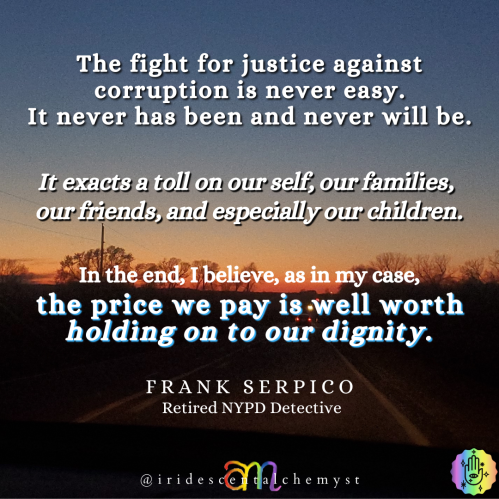
Since that day I have fully embraced my role, and the universe has responded with countless synchronicities to nudge me in the right direction and reassure me that I am on the right path. It has been a rollercoaster ride of smiles and cries, of debilitating heartbreak and exponential joys… but with each passing day the exact path has gotten clearer.
Educate and Empower
I understand that a majority of people do not have the same attitudes or inclinations where substance use is concerned, but I assert that my children were never in danger as a result of my substance use, nor were they ever exposed to drugs. Over the past several years, I have observed that most addicts and alcoholics do not neglect their children intentionally.
Quite the opposite, most addicts care deeply for their children. They have unresolved wounds from childhood and lack coping mechanisms. They have significant knowledge deficits. They have a crippling lack in resources. They suffer added guilt and anxiety as a result of many factors. And they are scared to ask for help out of fear that the authorities will take their children.
There is a huge gap between theory, practice, and reality with the systems currently in place. Every health and mental health discipline can offer a different vantage point and valuable input, but these professions lack the insight of real-world experience and applicability. Addicts and alcoholics have a hard time accepting advice and direction from someone that has no idea what they have been through.
Even if they are able to successfully complete a treatment program, there are many factors that are necessary for long-term sobriety that our society doesn’t address. In fact, there are many aspects of our society that directly contribute to the high incidence of relapse that I plan to bring to the attention of those that can help me advocate for change.
What’s Next
I have more recently taken steps to put together a neighborhood association. I have brought together a team and we are working diligently to restore a building that will be the future home of our non-profit organization aimed at empowering teens and adults in our community. Learn more about this building in my post titled Asking for Help!
I continue to email organizations and individuals that are involved with the criminal justice system, family court, child protection and family service providers, medical professionals, and mental health providers in order to raise awareness regarding my concerns. I also continue to have conversations with the people the universe brings to my life that need my guidance, and reach out to prominent community members and authorities as becomes necessary.
I appreciate your ongoing support as I continue to develop these big plans the universe has for me to be the change. Until I am more established, you can help me out by making your Amazon purchases using my affiliate link! I will update as new developments unfold.
Thank you for your love and support! You are appreciated!
Want new posts in your inbox? Don’t miss out!
References
Brainwashing: Coercive Persuasion Techniques. (2018, November 26). Exploring Your Mind. https://exploringyourmind.com/brainwashing-coercive-persuasion-techniques/
Brinkerhoff, D., & Goldsmith, A. (2002). Clientelism, Patrimonialism and Democratic Governance: An Overview and Framework for Assessment and Programming. https://pdf.usaid.gov/pdf_docs/Pnacr426.pdf
Coercive Persuasion – Prime Examples, Stages, and Mind Control Tactics. (2021, April 20). Exploring Your Mind. https://exploringyourmind.com/coercive-persuasion-prime-examples-stages-and-mind-control-tactics/
Lanius, R. A., & Hopper, J. W. (2008). Reexperiencing/Hyperaroused and Dissociative States in Posttraumatic Stress Disorder. Psychiatric Times, 25(13). https://www.psychiatrictimes.com/view/reexperiencinghyperaroused-and-dissociative-states-posttraumatic-stress-disorder
Mayo Clinic. (2017). Dissociative disorders – Symptoms and causes. Mayo Clinic; https://www.mayoclinic.org/diseases-conditions/dissociative-disorders/symptoms-causes/syc-20355215
Schein, E. H. (1961). Coercive persuasion; a socio-psychological analysis of the “brainwashing” of American civilian prisoners by the Chinese Communists. Internet Archive. https://archive.org/details/coercivepersuasi0000sche/page/244/mode/2up?view=theater
Singer, M. (n.d.). SINGER’S CONTINUUM OF INFLUENCE & PERSUASION. https://www.cultrecover.com/sites/default/files/pdfs/CONTINUUM_INFLUENCE.pdf
Singer, M. T., & Lalich, J. (1995). Cults in our midst: The Hidden Menace in Our Everyday Lives. Internet Archive. https://archive.org/details/cultsinourmidst00sing
Support my work by sharing this blog post! Thank you in advance for your help spreading the word about this important information!
3 responses to “Education? Or Indoctrination?”
-

[…] bias and Education or Indoctrination? are both articles I wrote that were inspired by my experiences with the department of human […]
LikeLike
-

[…] bias and Education or Indoctrination? are both articles I wrote that were inspired by my experiences with the department of human […]
LikeLike
-

[…] white pumpkins, 1 for each of my children. Elijah’s pumpkin featured the 8 criteria for thought reform (brainwashing). Noah’s pumpkin listed the symptoms exhibited by a child subjected to parental […]
LikeLike

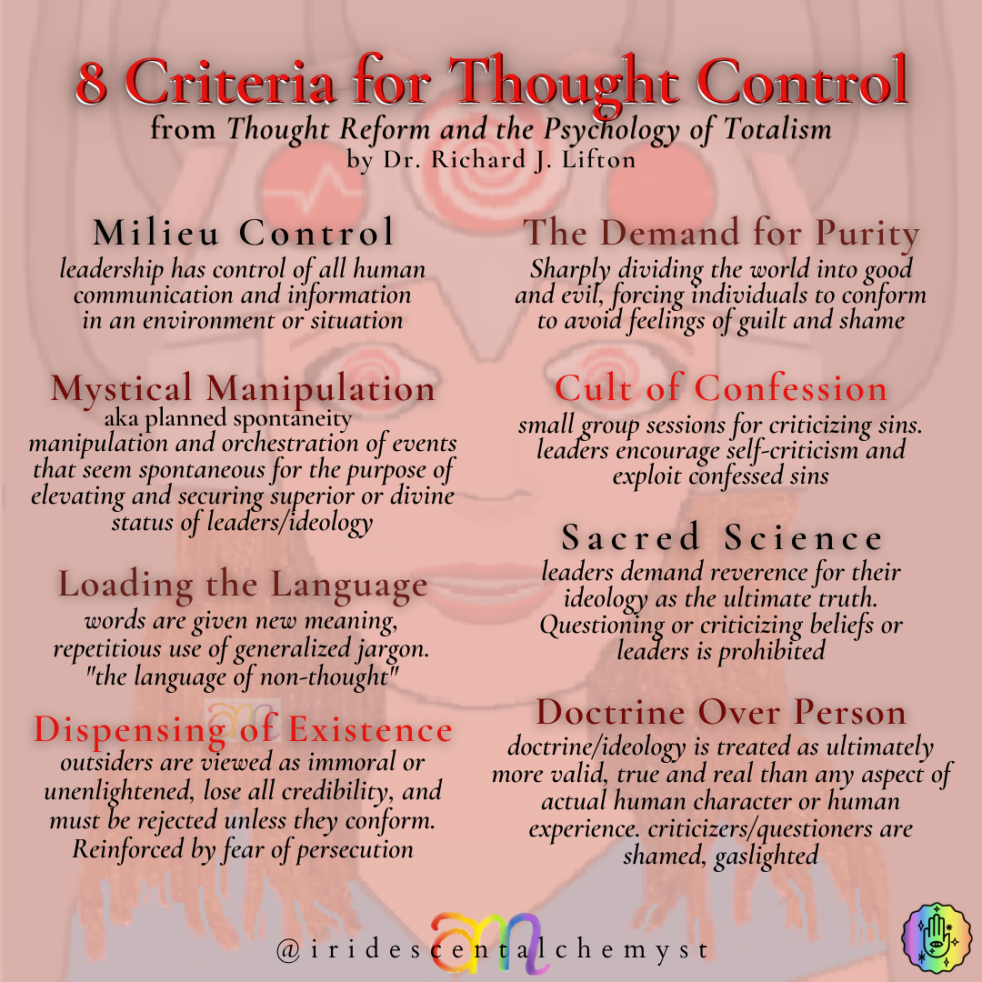
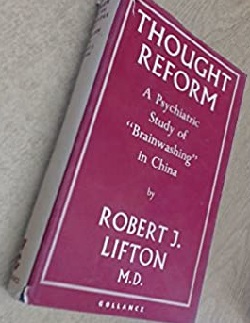

Leave a comment